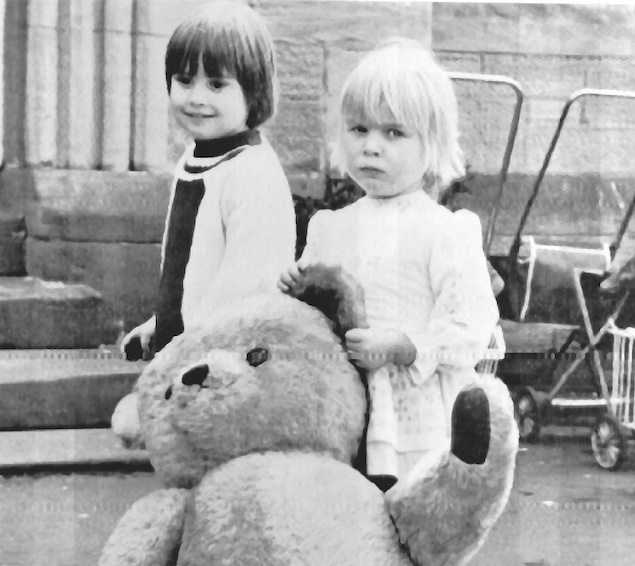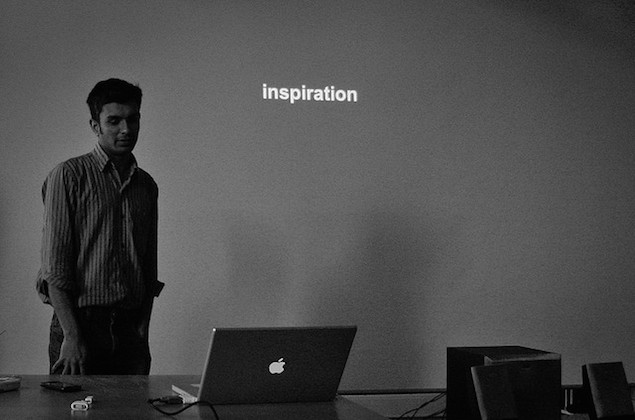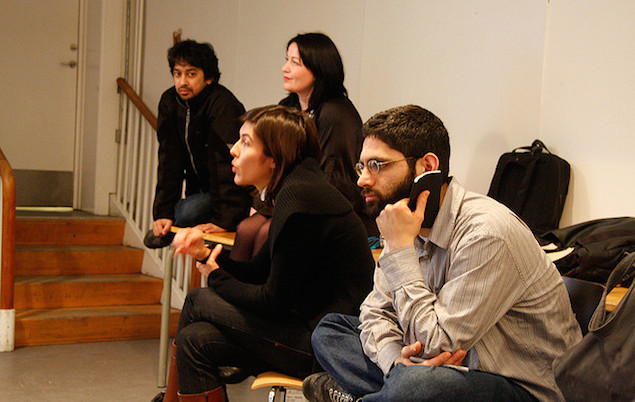Work • Sorrows of Work
On Stress and Inner Voices
We don’t often think about it – and may never discuss it with others at all – but pretty much everyone has voices in their heads. Not in any sinister or disturbing way: just the murmuring stream of thoughts that runs along inside our minds most of the time. Sometimes, the voice is more explicit, encouraging you to run those final few yards: ‘you’re nearly there, keep going, keep going’. Or you might find yourself berating your ex in your head: ‘You never understood how much you hurt me, I tried to tell you, but you’d never take it in. You were always running away from the truth about yourself, weren’t you?’ And maybe the tone here is more assured and calmer than in fact you ever quite managed to be with them on that topic.
But sometimes, the inner voice is simply not very nice at all. It is defeatist and punitive, panic-ridden and humiliating. It doesn’t represent anything like our best insights or most mature capacities. It’s not the voice of our better nature. We find ourselves saying: ‘You disgust me, things always go to shit with you.’ This might feel natural, but another person in a similar situation might have in their head a very different kind of inner monologue: ‘you’ve been here before and it was OK; it’s tough and that’s fine, you’re going to pull through, just keep calm.’
Where do inner voices come from? An inner voice always used to be an outer voice. We’ve absorbed the tone of a harassed or angry parent; the menacing threats of an elder sibling keen to put us down; the words of a schoolyard bully or a teacher who seemed impossible to please. We internalised the unhelpful voices because at certain key moments in the past they sounded compelling. The authority figures repeated their messages over and over until they got lodged in our own way of thinking.
To change our inner voices we need to encounter equally convincing and confident, but also helpful and constructive varieties of voices over long periods. We need to hear them often enough and around tricky enough issues that they come to feel normal and natural responses – so that, eventually, they come to feel like things we are saying to ourselves; they become our own thoughts.
© Flickr/Kevin Dooley
Unfortunately, we are very much more likely to have the irritated voice of a teacher berating us (aged seven) for not knowing the four times table than to have the voice of Donald Winnicott playfully and lightly encouraging us to take perspective. Or it’s more likely we’ve got the words of Melissa Fry (aged 13) making us feel eternally inadequate for having the wrong haircut, skinny shoulders or the wrong kind of bike burnt into our imaginations, rather than the voice of Montaigne reminding us wryly of the universal character of folly and reminding us that (in truth) no one worth caring about judges other people in those terms.
Slightly brutish voices tend to be the ones that speak loudest, while the nicest, kindest, wisest and most constructive voices are comparatively quiet. So, if we want to internalise the better voices, we need to have a deliberate and active strategy for making this happen. Leaving things to chance won’t do, because the odds are we won’t meet these really benign voices at the moments when we most need them.
El Greco, St. Dominic Praying (1588)
In the past, religions took the idea of voice-internalisation very seriously – and developed a variety of rituals and concepts to help this to occur. One of them was prayer. Certain prayers involved the frequent, regular repetition of helpful turns of phrase, like: ‘I have sinned in my thoughts and in my deed; in what I have done and in what I have failed to do…’ – which is an attempt to internalise humility.
Catholicism introduced the practice of the conscious ‘imitation’ of the saints, where one was invited to ask what a particular saint would have thought or said on a stressful or tempting occasion. Catholicism sets before its believers some two-and-a half thousand of the greatest, most virtuous human beings who it feels have ever lived, offering them up as potential friends whom the faithful can talk to, look at and be inspired by. These saints are each in their different ways exemplars of qualities we should hope to nurture in ourselves. Saint Joseph, for instance, may teach us how to cope calmly with the pressures of a young family and how to face the trials of the workplace with a modest and uncomplaining temper. There are moments when we may want to break down and sob in the company of Saint Jude, patron saint of lost causes, whose gentle manner can grant us comfort without any need to find immediate solutions or even hope. At times of anxiety, we could turn to Saint Philip Neri, who would never underplay our problems or humiliate us but would know how to tease out our sense of the absurd and make us laugh therapeutically at our condition. We might find it particularly consoling to guess at how the imperturbable Saint Philip would handle the hazards of a family reunion or the crash of a computer’s hard drive.
Guercino, Philip Neri (1656)
To enhance our imaginative connections with the saints, Catholicism provides us with calendars that list their birthdays, so that we may have regular occasion to withdraw from our social circle and contemplate the lives of people better than we are, for example, people who gave away all their money and wandered the earth doing good works while wearing a rough tunic to crucify the flesh (St Francis) or who used their faith in God to magically reattach a severed ear to its distressed owner’s head (St Cuthbert).
An opportunity to remember positive inner voices: a sixteenth-century English psalter, tabling the birthdays of, among others, Saints Hugh, Katherine, Theodore, Edmund, Clement, Barbara, Lucy and Osmund
The Christian idea of a ‘patron saint’ is really a device for getting us to internalise a voice that is useful at times of difficulty or anguish.
Andrea Mantegna, St. Sebastian (1480)
Saint Sebastian (who was shot by Roman archers on the orders of the Emperor Diocletian in 288 AD) is the archetypal voice of courage and commitment; he’s urging us to stand firm, to stick with our convictions even though people might be saying very critical or mean things, and to believe that suffering and being treated unjustly are normal (though horrible) parts of the well-lived life. We can admire the determination of these Catholic saints to shape constructive, helpful, sane and kind inner voices – without entirely agreeing on what those voices might be saying.
In addition, Catholicism perceives that there is a benefit to being able to see our ideal friends around the house in miniaturised three dimensional representations. After all, most of us began our lives by having nurturing relationships with bears, bunnies and other animals, whom we would talk to and would be tacitly addressed by in turn. These animals were skilful at conveying their consoling and inspiring personalities to us. We would talk to them when we were sad and were comforted when we looked across the bedroom and saw them stoically enduring the night on our behalf.
© Flickr/Scottish Libraries
Internalising teddy’s voice: teddy is calm, cheerful, gentle… everything we want to be ourselves
Catholicism sees no reason to discontinue the structure behind such relationships and so invites us to buy wood, stone, resin or plastic versions of the saints and place them on shelves or alcoves in our rooms and hallways. At times of domestic chaos, we can look across at a plastic statuette and inwardly ask what Saint Francis of Assisi would recommend that we say to our furious spouse or hysterical children now. The answer may be inside us all along, but it doesn’t usually emerge or become effective until we go through the exercise of formally asking the question of a saintly figurine.
St Francis: What would he do next?
A well-functioning secular society should take more care with its role models and ‘voice’ internalisation processes. The harshness of our inner voices could be corrected by having access to a range of imaginary friends, whose fortifying wisdom we would regularly and ritually be able to remind ourselves of. An absence of religious belief in no way invalidates a continuing need for patron saints of qualities like Courage, Friendship, Fidelity, Patience, Confidence or Scepticism. We can still profit from moments when we give internal space to the voices of people who are more balanced, brave and generous-spirited than we are. Like children with their favourite stuffed animals, we might spend time with mature beings, through whose imaginary presence we could hope to reconnect with our calmest possibilities.
There are essentially six different types of stress – and six kinds of ‘inner voice’ we need to foster in order to deal with them.
One: ANGER-STRESS
EXAMPLES:
One of the major kinds of stress can be termed ‘anger-stress’. This is when the feeling of not being able to cope is translated into shouting, rage and slammed doors. One seems merely angry, but beneath the theatrics, there is – importantly – a particular kind of panic at work.
Anger-stress arises in response to unexpected setbacks. For example, when a sudden drilling starts up in the street outside, just at the moment when one is settling down to do some concentrated work: the drill seems to be attempting to shatter one’s mind rather than the pavement. Last week it was the drains, now it’s the cable guys doing their nonsense. How can one live in a city like this?
© Flickr/Tomy Pelluz
Or else panic sets in when bureaucracy shows its most intransigent face: one is at the airport, there are 19 minutes until the plane is due to takes off, one can see it through the window, but the staff member insists that regulations require one to be 20 minutes ahead of the gate push-back time in order to board. One has a meeting to go to in a foreign city, 30 people are waiting, it’s crucial for business; one begs and cajoles, but to no avail. One ends up – very shamefully – calling the check-in person a ‘stupid fu***** automaton’ and banging the desk in fury like a child.
Or else the brilliantly slim and light laptop we’ve just bought freezes up and displays an error message just ahead of sending colleagues an important document. One curses those oily optimistic people at Apple, who seem so damn indifferent to one’s fate.
CAUSES
The cause of the anger-stress is a seeming deep injustice which appears not to be recognised by the world. A particular craziness, unreliability, meanness, obtuseness appears not to have received enough attention – and therefore one erupts into anger in a vain attempt to correct or protest at the indifference of others. The outburst draws energy from a desire to externalise the pain the world has inflicted and to strike back with equal force (even if only by flinging a cushion against the wall). Our anger is a (doomed) attempt to communicate the degree to which our sense of justice has been violated. We want everyone to know that the behaviour of the airline is outrageous, that the roadworks are profoundly wrong and that it is absurd that the richest corporation in the world should make laptops that routinely crash. We make a lot of noise because no one else seems to realise how terrible it all is.
© Flickr/Stefan
Our rage comes down to a betrayed optimism: a dramatic gap has opened up between how we expected things were going to go and how they have actually turned out. We had believed that the morning at home would be tranquil; we had believed boarding the flight would be easy, we had assumed the computer was reliable…
SOLUTION
The priority is to redraw one’s underlying image of what is normal in a more gently pessimistic direction. One is suffering not merely because things have gone wrong, but because they have gone wrong against a backdrop where one expected them to go right; and it is this second, aggravating factor that is both vicious in its effects and yet eminently amenable to treatment.
Stress-anger is laced with strong doses of paranoia. It seems one has been singled out for suffering. So one has to open the lens and see that one’s mishaps, though maddening, are neither unique nor representative of anything in one’s character. No one is specifically out to get us. Many millions have suffered computer malfunctions. Airline staff are known the world over for their intransigent manner. The laying down of fiber optic cables has turned all streets into drilling zones. We need to get more acquainted with the ample role of frustration in every ordinary and good life.
© Flickr/Brian Yap
It’s important that such bad news be broken to us in a particular way; a voice which seems gentle, kind and unhurried. It should feel as if a sympathetic arm was being put around our shoulder by someone who has lived long and seen a great many sad things, which hasn’t embittered them however, but has afforded them a melancholy wry look on the trials of existence. They tell us that ‘of course’ life is frustrating and that in many ways, it would have been better never to have been born. They know how it feels, they have been there too (our rages which we’re now embarrassed about are things that every decent human being sometimes goes through; it’s nothing to be proud of, but nor is it a reason to hate oneself indefinitely. We’ve all had our hysterical moments).
It is helpful not just to know these arguments in theory, but also to have an example of someone who put them into practice in their own life. We need a patron saint of experienced, wry pessimism; a patron saint to help quell the rash optimism that lies beneath our most vicious outbursts.
PATRON SAINT: ARTHUR SCHOPENHAUER
Born in Danzig in 1788, Arthur Schopenhauer is one of the world’s finest philosophers and most adorable grumps: “There is only one inborn error,’ he tells us, ‘and that is the notion that we exist in order to be happy… So long as we persist in this inborn error… the world will seem to us full of contradictions. For at every step, in great things and small, we are bound to experience that the world and life are certainly not arranged for the purpose of maintaining a happy existence… hence the countenances of almost all elderly persons wear the expression of what is called disappointment.”
Schopenhauer is always speaking in the voice of mature pessimism: of course, things work out pretty badly, he tells us, with a glint of humour in his eyes. They usually do. What else can one expect? The world is populated by bastards, fools and selfish egoists. I get it. They’ve let you down. ‘I know’, he tells us down the ages. The same kind of thing happened to me just about every single day of my life…
© Flickr/Arnoooo
Schopenhauer tells us without bitterness that life is quite sad. He’s free of bitterness because he is not expecting it to be wonderful; he’s not surprised or amazed or even particularly disappointed when marriage, career, travel, social life – and the mending of the roads – turn out to be a bit awful.
If we can internalise his words and the attitude they express and draw upon them we we need them, then our rage and bitterness are lessened, we are still faced with problems – of course – we still have to book the flight, get on with working or sort out the power supply, but with a slightly less panicked and persecuted air.
Feast on the consoling, stress-reducing pessimism of this noble patron saint:
“We can regard our life as a uselessly disturbing episode in the blissful repose of nothingness.”
“Human existence must be a kind of error… it may be said of it, ‘It is bad today and every day it will get worse, until the worst of all happens.”
“Life is like a soap-bubble which we maintain and inflate for as long as possible, yet with the absolute certainty that it will burst.”
© Flickr/Kari
“Life is a sorry business, I have resolved to spend it reflecting upon it.”
“Sometimes I speak to men and women just as a little girl speaks to her doll. She knows, of course, that the doll does not understand her, but she creates for herself the joy of communication through a pleasant and conscious self-deception.”
“We should always be mindful of the fact that no man is ever very far from the state in which he would readily want to seize a sword or poison in order to bring his existence to an end; and those who are far from believing this could easily be convinced of the opposite by an accident, an illness, a violent change of fortune – or of the weather.”
“After his fortieth year… any man of merit… will hardly be free from a certain touch of misanthropy”
And finally, a sentence that should be written above all airport entrances and on the back of computers: “Human existence must be a kind of error.”
Two: HUMILIATION-STRESS
EXAMPLES
Stress is always closely tied to a fear of failing at something. Humiliation-stress is a particular subcategory where what one most fears about failing are – in essence – the imagined mean reactions of others. One is stressed about being laughed at and denigrated, about having one’s faults cruelly discussed, about being the butt of jokes; one is going to fail and lose one’s dignity and good standing.
© Flickr/Tobias Toft
This is the stress that kicks in minutes before one is due to go on stage to give a presentation; or when one is going to finally launch an online business that one left a secure job in order to start; or when one is publishing a book, standing for office or will be ranked in the office sales force hierarchy.
CAUSES
In states of humiliation-stress, the mocking and contemptuous voice has come right inside one’s head. It’s no-longer simply stating the mean thoughts of other people, it’s become the voice of one’s own fears – whatever the outside world is actually saying. One is always ready with a highly dispiriting narrative about who one is. At times, one can just about tolerate oneself. With lots of success, one can stay one step ahead of the inner denigrator, but every time a challenge looms, the critical voice comes back: ‘I am indeed, as the critics say, an idiot, a failure and a fool’.
Humiliation-stress is a self-fulfilling prophecy. Because we’re so nervous around possible humiliation – because this fear is so active and powerful – we get flustered and make extra mistakes, we lose focus, we stumble and get confused. And then of course we do become the targets for the harsh, humiliating judgements of others.
© Flickr/Tobias Toft
The root cause of humiliation-stress is the belief that love, respect and kindness only ever come via worldly success or competence. Deep down we have become convinced that certain kinds of imperfect action (not being able to make a public speech, taking time to learn to drive a car, not being especially brilliant at sales, writing a mediocre book) rightly debar anyone from the warm embrace of love and appreciation. Only those who succeed can be loved.
SOLUTION
We urgently need to incorporate a voice that separates out achievement from love: that reminds us that we may be worthy of affection even if we fail and that being winner is only one part, and not necessarily the most important part, of one’s identity.
This is – traditionally – the voice of the mother, but perhaps also of the nine-year-old child chatting to his or her mum or dad about a stress at the office. It is the voice of a person who loves you for being you, outside of achievement.
Paradoxically, knowing one is loved whatever happens to one in the world sets up ideal preconditions for doing well. It gives one the energy to take risks and feel resilient – without letting acute anxiety get in the way of performance.
PATRON SAINT: GUANYIN
Guanyin, 12th Century
In Buddhism, Guanyin is a reassuring female deity one goes to visit in temples and chats to about one’s largest woes. Like the Virgin Mary, she hears us in our distress, meets us with tenderness and strengthens us to face the tasks of life. She is the person one thinks of when one can’t cope, when one just wants to weep, pull the duvet over one’s head and craves to be forgiven by someone deeply kind and gentle. We should be mature enough to allow ourselves moments when we regress to be in the company of such a voice.
The centrality of maternal figures in both Buddhism and Christianity suggests that adult lives share moments of deep self-doubt – and longings to recover some of the security of childhood. We need to be reassured that these wishes are not a sign that we have failed as human beings.
© Flickr/Max Khokhlov
Guanyin’s role is to hear us in our distress, to listen with mercy and tenderness to our fears. She gives voice to the thought that adult life inevitably will involve moments of deep self-doubt, and feelings that one cannot cope alone. Such vulnerability is not to be read as a sign we have failed as a human. Guanyin’s implicit thesis is that being loved and worldly success are two separate things. You deserve compassion not because of the excellence of what you do, but because you exist. Achievement is not the currency of kindness.
We need to make this voice our own and to summon it inside our own heads when faced with humiliation-stress. It doesn’t make the task go away. One will still have to make the speech, get better at selling (or find another job); but these real tasks can now be faced with a little more poise. Because a little less is on the line. The root of the extreme stress was not purely the fear that one might fail. Rather it was the incendiary thought that failure would mean you deserved to be ridiculed and abandoned. When the threat of that emotional catastrophe is lifted, one is better placed to get on and cope with the practical tasks to hand.
Three: PANIC-STRESS
EXAMPLES
You’re up against a huge challenge: you’ve recently taken up rock-climbing as a sport. You’re in Scotland, several hundred meters above the ground, on a cliff face. Suddenly, you panic. You can’t do this. You’re meant to keep climbing another thirty meters, veering to the left, making use of the drier limestone, before you reach flat ground and can make it gently down to Fort William. The problem is, you’re unable to make even a single move. Fear has frozen you. You’re going to drop down and meet your end at the base of the cliff. You have had a look below and the trees seem like matchsticks. You have a wife (who told you this wasn’t a good idea) and three children at home.
© Flickr/Paul Savala
Or, to take another example, you’re supposed to get a report done before Tuesday, but there are three big sections that you’re not quite on top of yet. You are also supposed to give a briefing on Monday about the Swedish strategy and there’s a problem emerging with the new key legal person you hired last month. You feel that the problems are too hard and multiple and that you will soon be found out by the management. You put your head in your hands and are deeply tempted to walk across to the corner office and hand in your resignation.
CAUSES:
In deciding whether or not panic is appropriate, we don’t calmly scan the horizon, measure our strengths, take a cool assessment of our own capacities and mobilise our forces in strict response to the demands of the situation. We respond by instinct – and these instincts are often nothing more than the incorporated voices of some distinctly panicky others from way back.
Many of us grew up around nervous people: people who lost their tempers the moment the parking ticket couldn’t be found, who were knocked off course by relatively minor administrative hurdles (the electricity bill), who felt daunted by the prospect of going on holiday (there were always screams on the way to the airport) and who grew jumpy every time they momentarily mislaid the house keys… These people had no faith in themselves and therefore – without necessarily wanting to do us harm – couldn’t have much faith in our own abilities. Every time we faced an exam, they got more alarmed than we did. They always asked multiple times if we had enough to wear when we went outside. They worried about our friends and our teachers. They were sure the gap year was going to turn into a disaster.
© Flickr/Michael Coghlan
Now these voices have become our own and cloud our capacity to take an accurate measure of what we are capable of. We have internalised voices of irrational fear and fragility.
SOLUTION
It’s a symptom of panic that our alarmed response feels – at the time – deeply plausible. It doesn’t reveal that it is an exaggerated response that is blinding us to an accurate assessment of our possibilities.
At such moments, we need an outside voice that can pause our runaway fears and remind us of the strengths we have latent within us, which the currents of panic have hidden from us.
Fear is catching, but – just as importantly – so can confidence be. If another person whom one respects tell us with calm authority that (from where they are standing) they sincerely think we can do it, we may just be able to find the wherewithal to side with their verdict. We respond well to having a good image of ourselves to try to live up to – as every good leader knows.
PATRON SAINT: GENERAL EISENHOWER
General Dwight D. Eisenhower addresses American paratroopers prior to D-Day
General Eisenhower led American troops through some of the most fearful events of World War II. He was legendary for spending a lot of time with his soldiers on the front, and in particular, with managing to transmit a high degree of confidence to them.
When he told his troops (as he often did) ‘I know you can do it,’ this wasn’t a vapid bromide thrown out to encourage hapless cannon fodder before he bolted back to the comforts of his command centre. It reflected a real faith that his young American charges truly had a very good chance of pushing back the German forces that controlled northern France. Though the Germans had been victorious in the West since 1939, Eisenhower understood that in the long-term, the advantage would necessarily go to the Allies: they had the largest number of troops, superior technology and men motivated by a love of freedom rather than fear of dictatorship. His confidence wasn’t bluster, it was based on seeing virtues in his men that fear had blinded them to. His words bridged the gap between what they were capable of, and what – on the night before parachuting into Normandy – they could remember of themselves through the fog of their anxiety.
We should – when facing our own more modest challenges – have a version of Eisenhower in our own minds, ready to remind us that (tomorrow morning) we will surely have the strength to do what the task demands of us.
FOUR: SHAME-STRESS
EXAMPLES:
This is the stress one feels in the wake of having done some shameful things: stayed in bed all day when we should have been at work; downloaded pornography on the family computer; shouted at a guy at the office; procrastinated for three weeks with a report; flirted with the person in charge of North American sales…
© Flickr/Holly Lay
It’s evident that normal, kind, sensible, mature people aren’t meant to do these things. There’s something wrong with us. We are one of the sick, warped ones. We are worried, fearful for the future, but more than that, ashamed of who we are.
This isn’t just unpleasant. This limits one’s ability to move on. The existence of the bad thing becomes a reason never to develop. ‘If you’re here, you’ve got to stay here’, says the inner voice. Or, even more brutally, ‘You’re doomed not to be a freak.’
CAUSES
The panic is rooted in an inability to get a clear picture of what is actually normal. The panicked person suffering from shame-stress can’t believe that quite good people have been through similar rather contemptible moments.
People who otherwise displayed loyalty, dedication, seriousness, grandeur also went through stages where they were extraordinarily lazy, or mean or did some strange things around sex.
These lapses may not be anything to be proud of, but they have a role in the narrative of an ordinary well-lived life. People whom one admires have been here too.
SOLUTION
We need to broaden our sense of how much contemptible stuff can go on in an otherwise good life.
We don’t need a voice that condones our bad sides: we need one that can calmly recognise them and accept them as the price people sometimes have to pay in order to move on to a further stage of growth.
PATRON SAINT: MADAME DEVAUCAY
In 1807, Ingres painted the portrait of Madame Antonia Devaucay de Nittis, a beautiful young woman living in Rome, who had been the mistress of many men at the top of Napoleonic French society and was at that moment the girlfriend of the French Ambassador to the Holy See, Charles Jean Marie Alquier. Antonia and Charles were having to navigate some choppy diplomatic waters: Napoleon had forcibly summoned Pope Pius VII to Paris in 1804 to attend his coronation as Emperor. The Pope resented but couldn’t ignore French power. Madame Devaucay needed to be political and persuasive without in any way seeming to be.
In Ingres’s remarkable picture, we contemplate not merely the appearance of a particular woman, as she was in Rome in 1807. We see the sort of person who might be able to rehabilitate us in our own eyes after a shameful episode. She is a corrective to shame-stress.
Something about Madame Devaucay’s mouth and smile speaks of worldly tolerance. It is easy to believe that we could tell this mouth almost anything (how we hadn’t paid our taxes or had done something bad in the French Revolution or had unusual sexual tastes), and its owner wouldn’t hold us primly to account, wouldn’t react with shock or moralising or provincial censorship; she would know her fair share about how troubled our souls can get without losing their claim to a fundamental decency.
Irritation with oneself can mount to unbearable levels because it feels so unusual to be foolish, sexual, furious, lazy… The inner voice says: you are the worst person, unique in your capacity for stupid behaviour (losing your temper, making a clumsy attempt to kiss X, wasting money, telling a lie to save your skin). By contrast Madame Devaucay is the voice of complex understanding.
She was very good at consoling people (Ingres included). She wasn’t frightened or shocked by admissions of frailty or failure. We can imagine her down the centuries saying: ‘I know you feel an idiot, but everyone is a bit like that sometimes; I understand. Actually, tomorrow it will seem quite funny and we’ll joke about it together. I’ve seen so much worse, from people you wouldn’t believe, even respectable and dignified ones whom we all admire…’
FIVE: EXAGGERATION-STRESS
EXAMPLES
This is the sort of stress where, to an outsider, it is at once apparent that perspective has been lost:
– someone has missed the train, now they’re saying they want to kill themselves.
– someone has had an argument with their partner over the washing up, now they want to break up.
– someone didn’t come first in the exam; now they feel their entire career is over.
CAUSES
In the visual arts, having perspective means a capacity to see different things in their true spatial relations: what is far away looks distant and smaller, what is near looks closer and larger. It was surprisingly difficult for artists to learn how to achieve perspective on a canvas – which suggests that the manoeuvre may be equally challenging in other areas of our lives.
Before the discovery of perspective: a swan is bigger than a tree and people would never fit through the doors of the houses
In our lives, having perspective involves an ability to compare an apparently traumatic event in the present with the experiences of humanity across the whole of its history – in order to work out what level of attention and fear it should fairly demand. How stressed should we be – really – about the argument, the delayed plane, the less than stellar result?
With perspective in mind, we soon realise that – contrary to what our inner voices suggest – hardly anything is totally unprecedented, few things are truly amazing and very little is absolutely terrible. The sacking will not mean the end of us; it will just change a lot of things in many different small and complicated ways. The economic indices are grim, but we have weathered comparable drops many times and even the worst scenarios only predict that we will return to a standard of living we had a few years ago, when life was still possible. A bad flu may disrupt international travel and defeat known drugs for a while, but research laboratories will eventually understand and contain it. The floods look dramatic, but in the end, they will affect merely a fraction of the population and recede soon enough. Cancers and heart-attacks have multiple causes that we may never understand completely, but eternal life was never on the agenda. Rome fell, but six hundred years later, everything was almost back to normal again.
SOLUTION
We need our dramas to be returned to size. We need to be made to feel small.
To be made to ‘feel small’ is, to be sure, a painful daily reality of the human playground. But to be made to feel small by something mighty, noble, accomplished and intelligent is to have wisdom presented to us along with a measure of kindness and persuasiveness. There are sights in the natural world (icebergs, mountains, stars) that can induce us to surrender our egoism without in any way humiliating us. We can set aside our ordinary concerns and take on board (in a way we never dare to do when we are under direct fire from other humans) the miniscule size of our dramas. We can survey ourselves as if from a distance, no longer offended by the wounds inflicted on our self-esteem, feeling newly indifferent to our eventual fate, generous towards the universe and open-minded about its course.
In moments of frustration and disaster, the philosopher Spinoza recommended that we consider what befalls us from a cosmic perspective or in his famous and lyrical coinage, ‘under the aspect of eternity’, sub specie aeternitatis. Fascinated by the new generation of telescopes and the knowledge of other planets that they yielded, Spinoza proposed that we imaginatively step out of ourselves and practice submitting our will to the laws of the universe, however contrary these might be to our intentions.
We should comfort ourselves for our humiliations not by trying to puff ourselves up, but by taking steps to further appreciate our nothingness. The modern world lacks rituals to put us gently in our place. It surreptitiously incites us to consider the present moment as the summit of history and the achievements of our fellow humans as the measure of all things – a grandiosity destined to plunge the majority of us into continuous swirls of anxiety and envy.
Religion used to restore perspective: at morning prayer and the weekly service, at the harvest celebration and the baptism, greater or lesser moments when we imaginatively step out of the earthly city and recalibrate our lives according to a larger, more cosmic set of measurements.
If there is any point of access to this process of re-evaluation open to both atheists and believers, it is via an element in nature that looms large in Spinoza’s Ethics; it is through the contemplation of the stars that we are afforded the best chance of accessing redeeming feelings of awe.
© Flickr/Hubble Heritage
Sadly, the scientific authorities officially in charge of interpreting the stars for us rarely realise the therapeutic import of the material they oversee. In austere scientific language, space agencies inform us of the properties and trajectories of heavenly bodies, yet they seldom consider astronomy as either a source of wisdom or a plausible answer to suffering.
However, science should matter to us not only because it helps us to control parts of the world, but also because it shows us what we will never master. We would do well to dwell daily, as the religious do on their God, on the nine and half trillion kilometres in a single light-year or on the luminosity of the largest known star in our galaxy, Eta Carinae, 7,500 light years away, 400 times the size of the sun and 4 million times as bright. We should punctuate our calendars with celebrations in honour of VY Canis Majoris, a red hypergiant in the constellation Canis Major, 5,000 light-years from earth and 2,100 times the size of the Sun. Nightly, after the main news bulletin and before the celebrity quiz, there should be a moment of solemnity as we dwell upon the 200 to 400 billion stars in our galaxy, the 100 billion galaxies and the 3 septillion stars in the universe. Whatever their value to science, the stars are in the end just as valuable to mankind as solutions to our megalomania and anxiety.
In recognition of our need to be repeatedly connected through our senses to ideas of transcendence, we should ensure that a percentage of all prominently positioned television screens be connected to live feeds from the transponders of our extraplanetary telescopes.
We would then be able to ensure that our frustrations, broken hearts, hatreds of those who haven’t called us and regrets for opportunities that have passed us by are continuously rubbed up against, and salved by, the thought of galaxies like Messier 101, a spiral structure 23 million light years away, sitting in the bottom left of the constellation Ursa Major, majestically unaware of everything that we are and consolingly unsaddened by all that tears us apart.
PATRON SAINT: MESSIER 101 GALAXY
An imagined rendering of Piccadilly Circus, with the adverts gone, replaced by a calming image of the Messier 101 galaxy, part of the constellation Ursa Major, fed live via the Hubble Telescope
SIX: HUMOURLESS-STRESS
EXAMPLES
A lot of stress has the incidental quality of being extremely earnest. With immense solemnity, we worry to an extraordinary extent about the results for Q3. Profits are marginally down in the Asia-Pacific region, and it seems as if someone had died. An interviewee is five minutes late, and everyone in the room is starting to twitch, look at their phones and remember all the other, far better things they could be doing.
CAUSES
As in exaggeration-stress, perspective has been lost, an ostensibly small things have started to loom very large.
SOLUTION
When dealing with exaggeration-stress, the strategy is to minimise the stressful situation in order to usher in calm.
But when dealing with humourless-stress, we need to take a different line: we need to exaggerate the stressful situation to such an extent that it becomes a source of comedy and therefore of a certain kind of calm too.
The strategy is to maximise the exaggeration to the point where even the worrier can see that their stress has grown far larger than its cause.
PATRON SAINT: MICKEY SACKS (WOODY ALLEN)
© Everett Collection/REX
In Hannah and her Sisters (1986), Woody Allen plays Mickey Sacks, who is like you and me, except a little more so. Everything we might worry about, he is onto already and he worries so much, with such theatricality and whining New York intonations, it has the peculiar effect of calming us down and making us laugh at our own exaggerations.
What we worry about every now and then, Mickey worries about at every moment. He worries about sex, the meaning of life, his relationships – and most of all, he worries about dying.
He is constantly detecting symptoms of his mortal diseases. Recently, he’s started to hear a slight buzzing sound in one ear. It can mean only one thing… He is dying of a brain tumour. This is how he interacts with his colleague Gail, as recorded in Woody Allen’s script for the film:
The telephone starts to ring, Gail pauses, looking offscreen. She takes off her glasses and squints.
GAIL
Mickey, what’s the matter with you? You’re all white!
The film cuts to Mickey, who is pacing and wringing his hands. He walks over to Gail. The phone continues to ring.
MICKEY
I feel dizzy. Sshh, you know, I don’t feel well.
He starts to pant, looking worriedly around the room. He continues to wring his hands as Gail stares at him, concerned.
MICKEY
Do you hear a ringing? Is there, is there a, is there a ringing sound?
GAIL
(gesturing)
Yeah. Yeah, yeah. I hear, I hear it.
She sits down and picks up the phone.
MICKEY
(shaking his head)
N-n-no, not that.
GAIL
(overlapping, into the telephone)
Hello?
MICKEY
(turning to Gail, gesturing nervously)
Sssss, if I have a brain tumour, I don’t know what I’m gonna do.
GAIL
You don’t have a brain tumour. The doctor didn’t say you had a brain tumour.
MICKEY
No, naturally. They’re not gonna tell you, because, well, you know, th–, sometimes the weaker ones will panic if you tell ’em. Oh, God!
(looking around worriedly and touching Gail’s shoulder: the phone is ringing again)
Do you hear a buzzing? Is there a buzzing?
Mickey is the voice of comic exaggeration. He helps us feel less stressed – and cope better with our worries because he makes them look so large, even we’re forced to concede that perspective has been lost. Most of the time, we tend not even to notice that we are exaggerating. That’s why we need comic voices. From the inside it feels simply so serious what time the taxi is going to come, or who said what to the boss or what the doctor will say. Mickey shows us how to deflate our exaggerations by pushing them further and further until their absurdity become obvious, and we willingly take the air out of them.
For this to work, the comedy has to be generous. If we simply mock Mickey (ourselves), we don’t gain any therapeutic benefit. Ideally satire and parody don’t leave us humiliated, because that’s no help in trying to cope better with anxiety. Rather, they teach us to be witty about our troubles and sorrows.
It’s a slightly weird truth that a lot of anxiety (and conflict) grows because we haven’t got a good way of backing out. We sort of know we are being silly in our massive worries and especially in our arguments with those close to us. It’s just that we don’t know how to climb down without being humiliated and perhaps conceding too much to the other person’s equally exaggerated contrary views.
Funniness, self-parody, irony, wry wit and humour all allow an attractive method of backing down while preserving one’s self-respect.
© Carlos Rui Ribeiro
***
In different ways, these six voices are correctives to our most vicious and unhelpful inner narratives. We should take care to rehearse them at moments when we can lay claim to a measure of sanity and calm – so they’ll be with us the next time the drilling starts or the plane is delayed.






















































